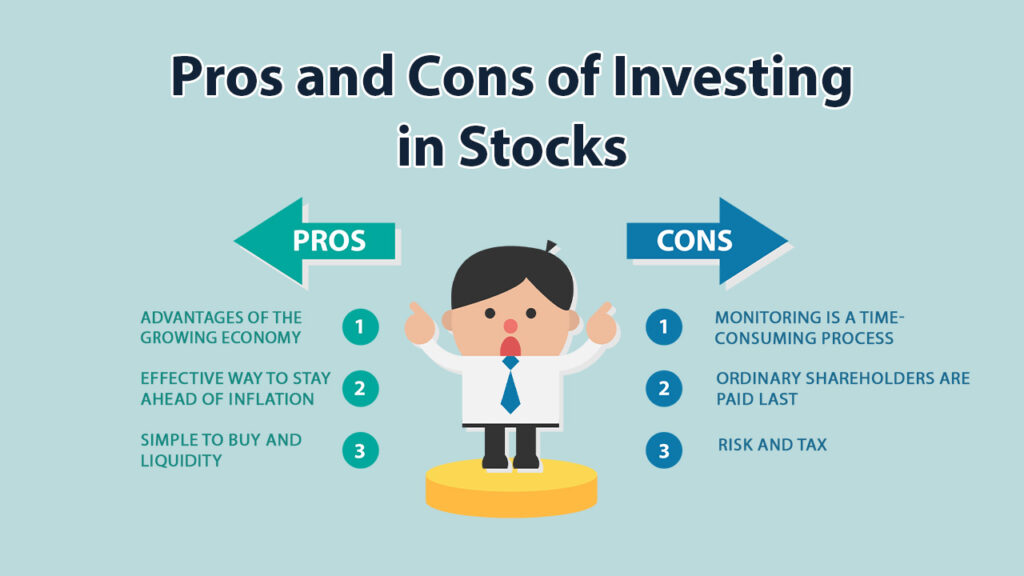Investing in the stock market can be an exciting and rewarding way to build wealth, but it also comes with its risks. Whether you’re a beginner or an experienced investor, understanding the pros and cons of stock market investing is crucial to making informed decisions. This article will explore the benefits and drawbacks of stock market investing, helping you understand what to expect as you enter or continue your investment journey.

The Pros of Stock Market Investing
1. Potential for High Returns
One of the most attractive features of stock market investing is the potential for high returns. Historically, stocks have provided significantly higher returns than other investment options like bonds or savings accounts. With the right strategy, time, and diversification, investors can experience substantial growth in their portfolios.
For instance, the average annual return for the S&P 500 index (a collection of 500 major companies in the U.S.) has been around 7-10% over the long term, after inflation. While returns can fluctuate, the stock market has shown consistent growth over time.
2. Liquidity
Stocks are among the most liquid assets available. This means you can buy and sell shares quickly and easily. Unlike real estate or certain investments that require more time and effort to sell, you can trade stocks on a daily basis, giving you flexibility in managing your portfolio.
3. Dividend Income
Many companies pay dividends to their shareholders, providing a steady income stream. Dividends are usually paid quarterly and can be reinvested to compound your returns over time. This is especially beneficial for long-term investors looking for passive income in addition to capital appreciation.
4. Diversification
By investing in different stocks or exchange-traded funds (ETFs), you can spread your investment across various industries, reducing the risk of losing money from a single poor-performing asset. Diversification is a key strategy to manage risk and ensure a balanced portfolio.
5. Ownership in a Company
When you buy stock, you essentially become part-owner of the company. This provides the potential for you to benefit from the company’s growth, success, and profits. Additionally, shareholders have voting rights in some companies, which can give them a say in corporate decisions.
The Cons of Stock Market Investing
1. Market Volatility
One of the major risks associated with stock market investing is volatility. Stock prices can fluctuate dramatically, sometimes within a short time frame. This volatility can be influenced by economic changes, company performance, geopolitical events, and market sentiment.
For new investors, sudden market drops or downturns can be unsettling and may lead to rash decisions, like selling off stocks in fear of further losses. While markets generally trend upward over the long term, short-term fluctuations are common.
2. Potential for Losses
While stocks have the potential for high returns, they also come with the risk of losing money. If a company’s stock price drops or if you make poor investment choices, you could lose a significant portion of your investment. Unlike bonds or savings accounts, stocks do not guarantee a return, and losses are possible.
For example, during the 2008 financial crisis, many investors saw their portfolios plummet as the market crashed. While markets recovered, investors who sold off their investments in panic missed out on the subsequent recovery.
3. Requires Knowledge and Research
Investing in stocks requires a certain level of knowledge and research. Understanding market trends, reading financial statements, and analyzing company performance are important skills for making informed decisions. Without sufficient knowledge, you risk making decisions based on emotions or unreliable information, which can lead to poor outcomes.
Many investors rely on financial advisors or stock market analysts to help them navigate this complex landscape, which can incur additional costs.
4. Time-Consuming
Although the stock market is liquid, investing successfully requires significant time and effort. Whether you’re monitoring your portfolio, researching companies, or analyzing market trends, keeping up with your investments can be time-consuming. This may not be ideal for people who don’t have the time or inclination to stay updated.
5. Emotional Stress
Investing in the stock market can be emotionally stressful, especially for those new to the experience. Watching your portfolio rise and fall can create feelings of anxiety, excitement, or frustration. Emotional decisions, such as panic selling or buying during market euphoria, can negatively affect your investment outcomes.
Conclusion
Stock market investing offers significant opportunities for growth, but it also carries risks that every investor must understand. The key is to balance the potential for high returns with the inherent risks of volatility and market uncertainty. With the right strategies, diversification, and a long-term perspective, you can mitigate some of the risks associated with stock market investing and build a strong portfolio.
Before making any investment decisions, it’s important to assess your financial goals, risk tolerance, and knowledge level. Consider speaking with a financial advisor to ensure that stock market investing aligns with your overall investment strategy.
Read More: https://wealthfitlife.com/10-best-side-hustles-to-boost-your-retirement-savings/
Frequently Asked Questions (FAQs)
1. How much money do I need to start investing in the stock market?
There is no minimum amount to start investing, but it’s recommended to start with at least a few hundred dollars to diversify your investments. Many brokerages also offer fractional shares, allowing you to invest with smaller amounts.
2. What is the best time to invest in the stock market?
The best time to invest is generally when you can commit to a long-term strategy. Market conditions will fluctuate, but timing the market perfectly is difficult. A consistent, long-term approach often leads to better results.
3. Can I lose all my money in the stock market?
Yes, it’s possible to lose a significant amount or even all of your investment if a company goes bankrupt or its stock value falls dramatically. However, investing in a diversified portfolio can help reduce this risk.
4. How do dividends work in stock investing?
Dividends are a portion of a company’s profits paid to shareholders, typically on a quarterly basis. They can be reinvested to purchase more shares, or you can take them as cash income.
5. What is the difference between stocks and bonds?
Stocks represent ownership in a company, while bonds are a form of debt issued by companies or governments. Bonds typically offer lower returns but are considered less risky compared to stocks.
6. Is stock market investing safe?
Stock market investing comes with risks, including market volatility and the potential for losses. However, it can also be rewarding over the long term if you diversify and adopt a sound investment strategy.
7. How do I choose the right stocks to invest in?
To choose the right stocks, research companies, evaluate their financial health, and assess their growth potential. Many investors also consider factors like industry trends, management quality, and past performance.
8. Should I invest in individual stocks or mutual funds?
Both individual stocks and mutual funds have their advantages. Individual stocks allow you to have control over your investments, while mutual funds provide diversification and professional management. It depends on your risk tolerance and investment goals.
9. Can I invest in the stock market without a broker?
No, you typically need a brokerage account to invest in the stock market. Online brokers make it easier for individuals to trade stocks with relatively low fees.
10. How can I reduce risk when investing in the stock market?
To reduce risk, diversify your investments, invest for the long term, and avoid making emotional decisions. It’s also important to educate yourself and consider working with a financial advisor for more tailored advice.
